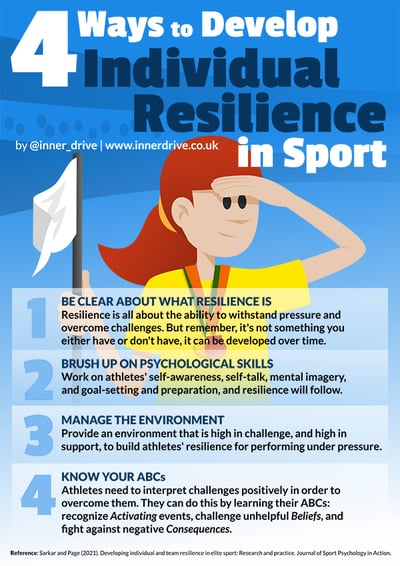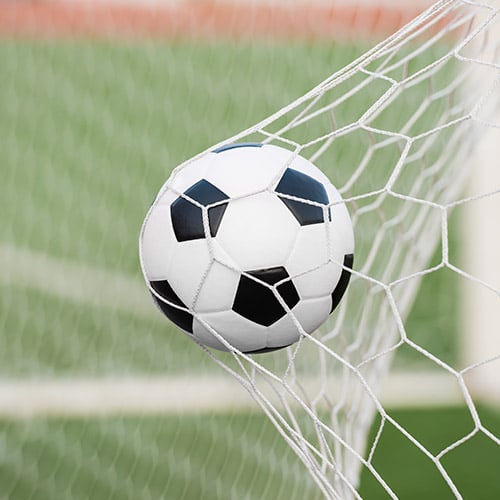Elite sport is full of pressures and challenges, on and off the field. Why is it that some athletes can withstand and overcome these stresses, while others crumble and wilt under the pressure?
Well, it all comes down to mental resilience. In elite sport, this is often as important as physical resilience. And it’s those athletes who dedicate themselves to training their mental resilience too that put themselves above the rest.
So, what can we do, as sports psychologists, coaches, and those who support athletes, to help them develop their mental resilience? Recent research has investigated this, and the authors have translated their research into 4 practical ways to develop individual resilience in sports. Let’s take a look…
Be Clear about what Resilience is
Unfortunately, resilience has become a bit of a buzzword in several fields of psychology, including sport. The term is thrown around, confused with other psychological concepts, and as a result some misunderstandings have developed. So, the first thing to do to help athletes develop resilience is to clarify what resilience actually is. This includes busting some resilience myths.
Resilience is the ability to withstand pressures and adversity, maintaining performance and well-being through difficult situations. But, it is not a case of either having or lacking resilience. It’s something that will depend on the situation, and which individuals can develop over time. Clarifying and defining resilience is important because this allows a common language between sport psychologists, coaches, and athletes themselves, from which they can work to develop athlete resilience.
Brush up on Psychological Skills
Research suggests that several psychological skills play a part in resilience, which are easy for athletes to work on and develop. So, coaches, sports psychologists, and those supporting elite athletes can focus on nourishing these psychological skills in athletes, including:
- Self-awareness, which helps athletes to have knowledge of their thoughts and emotions, and to develop a more positive outlook.
- Self-talk, which helps athletes to concentrate better and to be persistent.
- Use of mental imagery, which helps athletes to visualise what they want to achieve, and can help to reduce nerves and boost confidence.
- Goal setting and preparation skills, which help athletes to focus on what they can control, and puts them in a good position to perform under pressure.
These psychological skills all help athletes to motivate themselves, regulate their thoughts, focus their attention, boost their self-confidence, as well as recognise support from others. All of this will help them to better cope with stresses and perform under pressure.
Know Your ABCs
Resilient athletes have a challenge mindset. This means they face challenges positively and believe they have the resources to overcome them. The research suggests that we can help athletes to develop a challenge mindset by getting them to learn their ABCs:
- Activating events that might trigger difficult situations
- Beliefs about the activating event
- Consequences of the event for the athlete’s emotions and behaviour
This means that athletes need training to spot activating events, in both their professional and personal life, that might put them under pressure. Then, they need to learn to manage and challenge any irrational or unhelpful beliefs they might have about these events. Finally, they need to use this opportunity to put things into perspective, and remain calm and focused, to fight back against any negative consequences.
Recognising these ABCs will boost athletes’ challenge mindset and their confidence that they can overcome challenges and the negative effects of stress.
Manage the Environment
And finally, for a challenge mindset to work best, we need to create an environment that facilitates athlete resilience. It’s not all about testing athletes’ ability to withstand pressure, it’s also important to find and create an environment in which they can thrive. The best environment for resilience is one that is high in both challenge and support. Coaches can create this by maintaining high expectations of athletes’ abilities and performance, while also providing support. It’s a recipe for high athlete performance and well-being.
The research suggests that this environment can be achieved with a method called pressure inurement training. This involves gradually increasing the level of pressure athletes are exposed to in their training, through increasing the challenge and manipulating the environment. Coaches should then monitor athletes’ responses to this. If athletes struggle, increase support with motivational feedback, and maybe decrease the challenge for the moment. If athletes respond positively and adapt to the new level of pressure, you can continue to build up the challenges, alongside supportive feedback. This kind of training helps to prepare athletes for the kinds of challenges they may face in competition.
Final thought
Rising to the top in elite sport comes with many challenges along the way. To face these challenges, athletes need a good level of mental resilience. Coaches, sports psychologists, parents and others working with athletes can play a big part in strengthening athletes’ mental resilience. These tips are just a few of the key ways to help individual athletes develop resilience, and thrive in their sporting career.
For more on developing resilience in athletes, have a read of our blog on 9 Ways Olympians Develop Resilience.






